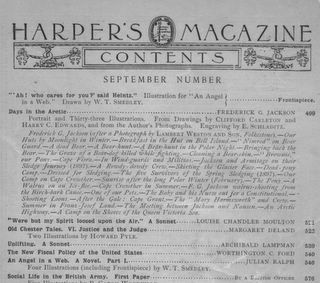
harper's contents--click on this to see it in more detail!
i went to our bookshelves to look for a picture that might be in a book we might have, an illustration of a garden in france in maybe 1890 showing a field full of glass bell jars over vegetables of some sort. no luck with the book, but as i am a print junkie i had to pick up something. look, here's an old magazine we got somewhere, probably a yard sale. Harper's Magazine, September issue. missing the cover. no date. maybe on the spine. wow 1898!!!
Harper's Magazine September, 1898
the language used, the lexicon, grammar, and spelling, were a bit stilted, but surprisingly similar to current language. what did stand out was the casual way that "white" superiority over "darker" races was invoked in several places. there are no photos, of course, but quite a few illustrations. scanning the contents i see six fiction pieces, two sonnets, two poems, three political essays, one outdoor adventure, two "papers"--one on social life in the british army and one of reminiscences and anecdotes on the life of Mr. Gladstone, the former prime minister of england.
here are short "reviews" of three articles:
"Days in the Arctic," Frederick G. Jackson
the story of six men who spent 3 years in the arctic at 80 degrees n. on a scientific expedition. they lived in a hut 20' x 20' with seven foot ceiling in Franz-Joseph Land. The archipelago of Franz Josef Land, on the northern rim of the continental shelf that underlies the Barents Sea, is the northernmost land mass in the Eastern Hemisphere. this could be a modern tale by the language. very interesting.
"Some Thoughts On The Policy Of The United States," James Bryce
the policy in question is the disposition of foreign lands. cuba, antilles, the phillipines. whether or not the US should have colonies. he says mainly no, because it would be too difficult to defend such far-flung places, except of course cuba. the big reason given though is the inability of the inhabitants of these places to be at all self governing and so enter the union as states. they are unfit for autonomy.
after a lengthy section on the unique system of US government and free elections and press, and the strength of a mostly homogenous population, citing the gradual expansion of the US westward and inclusion of the inhabitants, he goes on to say, with reference to the possible annexation of the antilles and/or the phillipines:
"But the inhabitants of these islands, alien in blood and speech, inferior--and some of them vastly inferior--both intellectually and morally, cannot be so incorporated and made a part of the american people."
The Experiences of the United States in Foreign Military Adventures," Professor Albert Bushnell Hart
he lists six periods: "(1) military expeditions and occupations in the Revolutionary and Barbary wars, 1775-1815. (2) expeditions and occupations for territorial expansion, 1797-1821. (3) relations with european countries, 1822-1835. (4) aggressive expeditions, 183601860. (5) relations with american neighbors, 1861-1872. (6) commercial and philanthropic interventions and expeditions, 1873-1898."
"In the twenty-two years from 1797 to 1819 there had arisen twenty cases of well-defined expeditions into foreign or disputed territory....."
"In the years 1845 '46 eight different expeditions were sent into Mexican territory."
"Between 1849 and 1854 four naval expeditions were sent to Japan to exert a pressure on that country....."
"In 1854, and again in 1855, American forces were landed in China, first to protect and then to oppose the Taiping rebels."
The United States at various times up to 1898 had sent "expeditions" to British and Spanish territory, Mexico, Canada, "Hawaii four times, Japan and China five or six times, Paraguay twice, Chile three times, the eastern coasts of Asia seven or eight times."
a long list, even in 1898.
he ends by saying that all interventions were successful, except the invasions of Canada, that we got a lot of territory and prestige, and that we had a free hand in american (by that i think he means the american continents), pacific, and oriental territories.
he ends with a warning that things will change. "...we must expect to find that no nation can share in the mastery of other hemispheres, and at the same time be sole master in its own hemisphere."

harper's ads
No comments:
Post a Comment